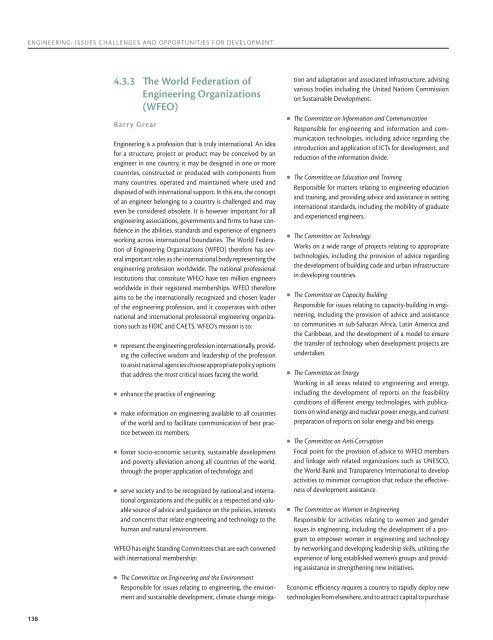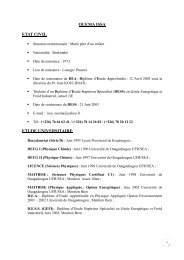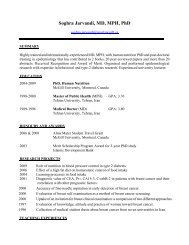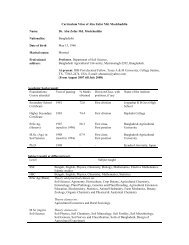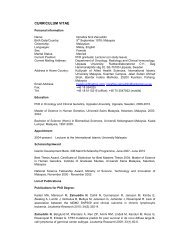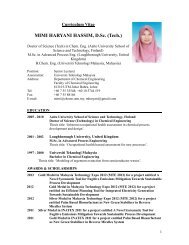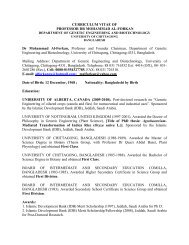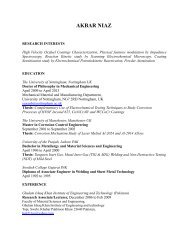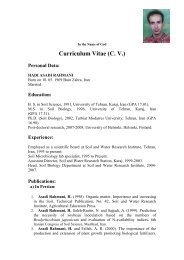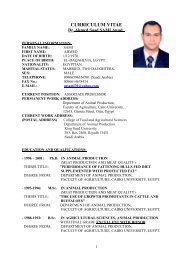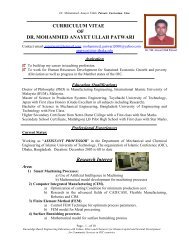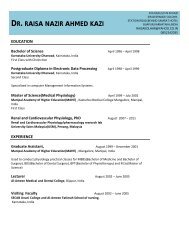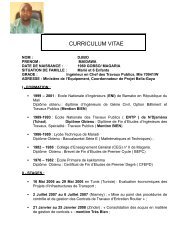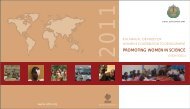Engineering: issues, challenges and opportunities for development ...
Engineering: issues, challenges and opportunities for development ...
Engineering: issues, challenges and opportunities for development ...
You also want an ePaper? Increase the reach of your titles
YUMPU automatically turns print PDFs into web optimized ePapers that Google loves.
ENGINEERING: ISSUES CHALLENGES AND OPPORTUNITIES FOR DEVELOPMENT4.3.3Barry GrearThe World Federation of<strong>Engineering</strong> Organizations(WFEO)<strong>Engineering</strong> is a profession that is truly international. An idea<strong>for</strong> a structure, project or product may be conceived by anengineer in one country, it may be designed in one or morecountries, constructed or produced with components frommany countries, operated <strong>and</strong> maintained where used <strong>and</strong>disposed of with international support. In this era, the conceptof an engineer belonging to a country is challenged <strong>and</strong> mayeven be considered obsolete. It is however important <strong>for</strong> allengineering associations, governments <strong>and</strong> firms to have confidencein the abilities, st<strong>and</strong>ards <strong>and</strong> experience of engineersworking across international boundaries. The World Federationof <strong>Engineering</strong> Organizations ( WFEO) there<strong>for</strong>e has severalimportant roles as the international body representing theengineering profession worldwide. The national professionalinstitutions that constitute WFEO have ten million engineersworldwide in their registered memberships. WFEO there<strong>for</strong>eaims to be the internationally recognized <strong>and</strong> chosen leaderof the engineering profession, <strong>and</strong> it cooperates with othernational <strong>and</strong> international professional engineering organizationssuch as FIDIC <strong>and</strong> CAETS. WFEO’s mission is to:■■■represent the engineering profession internationally, providingthe collective wisdom <strong>and</strong> leadership of the professionto assist national agencies choose appropriate policy optionsthat address the most critical <strong>issues</strong> facing the world;enhance the practice of engineering;make in<strong>for</strong>mation on engineering available to all countriesof the world <strong>and</strong> to facilitate communication of best practicebetween its members;■ foster socio-economic security, sustainable <strong>development</strong><strong>and</strong> poverty alleviation among all countries of the world,through the proper application of technology; <strong>and</strong>■ serve society <strong>and</strong> to be recognized by national <strong>and</strong> internationalorganizations <strong>and</strong> the public as a respected <strong>and</strong> valuablesource of advice <strong>and</strong> guidance on the policies, interests<strong>and</strong> concerns that relate engineering <strong>and</strong> technology to thehuman <strong>and</strong> natural environment.WFEO has eight St<strong>and</strong>ing Committees that are each convenedwith international membership:■The Committee on <strong>Engineering</strong> <strong>and</strong> the EnvironmentResponsible <strong>for</strong> <strong>issues</strong> relating to engineering, the environment<strong>and</strong> sustainable <strong>development</strong>, climate change mitigation<strong>and</strong> adaptation <strong>and</strong> associated infrastructure, advisingvarious bodies including the United Nations Commissionon Sustainable Development.■CommunicationThe Committee on In<strong>for</strong>mation <strong>and</strong>Responsible <strong>for</strong> engineering <strong>and</strong> in<strong>for</strong>mation <strong>and</strong> communicationtechnologies, including advice regarding theintroduction <strong>and</strong> application of ICTs <strong>for</strong> <strong>development</strong>, <strong>and</strong>reduction of the in<strong>for</strong>mation divide.■■■■■■The Committee on Education <strong>and</strong> TrainingResponsible <strong>for</strong> matters relating to engineering education<strong>and</strong> training, <strong>and</strong> providing advice <strong>and</strong> assistance in settinginternational st<strong>and</strong>ards, including the mobility of graduate<strong>and</strong> experienced engineers.The Committee on TechnologyWorks on a wide range of projects relating to appropriatetechnologies, including the provision of advice regardingthe <strong>development</strong> of building code <strong>and</strong> urban infrastructurein developing countries.The Committee on Capacity BuildingResponsible <strong>for</strong> <strong>issues</strong> relating to capacity-building in engineering,including the provision of advice <strong>and</strong> assistanceto communities in sub-Saharan Africa, Latin America <strong>and</strong>the Caribbean, <strong>and</strong> the <strong>development</strong> of a model to ensurethe transfer of technology when <strong>development</strong> projects areundertaken.The Committee on EnergyWorking in all areas related to engineering <strong>and</strong> energy,including the <strong>development</strong> of reports on the feasibilityconditions of different energy technologies, with publicationson wind energy <strong>and</strong> nuclear power energy, <strong>and</strong> currentpreparation of reports on solar energy <strong>and</strong> bio energy.The Committee on Anti-CorruptionFocal point <strong>for</strong> the provision of advice to WFEO members<strong>and</strong> linkage with related organizations such as UNESCO,the World Bank <strong>and</strong> Transparency International to developactivities to minimize corruption that reduce the effectivenessof <strong>development</strong> assistance.The Committee on Women in <strong>Engineering</strong>Responsible <strong>for</strong> activities relating to women <strong>and</strong> gender<strong>issues</strong> in engineering, including the <strong>development</strong> of a programto empower women in engineering <strong>and</strong> technologyby networking <strong>and</strong> developing leadership skills, utilizing theexperience of long established women’s groups <strong>and</strong> providingassistance in strengthening new initiatives.Economic efficiency requires a country to rapidly deploy newtechnologies from elsewhere, <strong>and</strong> to attract capital to purchase138


